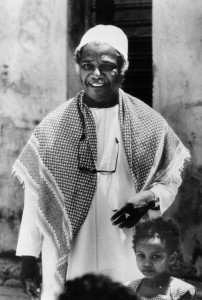Ali Mazrui, a scholar and prolific author who set off a tsunami of criticism in 1986 by writing and hosting “The Africans: A Triple Heritage,” a public television series that culminated in what seemed to be an endorsement of African nations’ acquiring nuclear weapons, died on Oct. 12 at his home in Vestal, N.Y. He was 81.
His family announced the death without specifying a cause.

Uhuru Kenyatta, the president of Kenya, where Professor Mazrui was born, said at the time of his death that he was “a towering academician whose intellectual contributions played a major role in shaping African scholarship.”
His books and his hundreds of scholarly articles explored topics like African politics, international political culture, political Islam and globalization. He was for many years a professor at the University of Michigan, and since 1989 had held the Albert Schweitzer chair at Binghamton University, State University of New York.
Reflecting his habit of provocation, Professor Mazrui wrote an article in 2012, posted on Facebook, accusing Dr. Schweitzer, the revered medical missionary in pre-independence Gabon, of being “a benevolent racist.” He wrote that Dr. Schweitzer had called Africans “primitives” and “savages,” and had treated Africans in a hospital unit that was separate from, and less comfortable than, one for whites.
Professor Mazrui’s courage transcended ideas. When he was a political-science professor in Uganda in the early 1970s, the country’s brutal dictator, Idi Amin, invited him to be his chief adviser on international affairs — “his Kissinger,” Professor Mazrui told The New York Times in 1986. Instead, he publicly criticized Amin and fled Uganda.
“The Africans,” a nine-part series that was originally broadcast by the BBC and later shown on PBS, portrayed Africa as having been defined by the interplay of indigenous, Islamic and Western influences. Professor Mazrui had acquired the perspective by growing up speaking Swahili, practicing Islam and attending an English-speaking school in Mombasa, Kenya.
Source: New York Times


